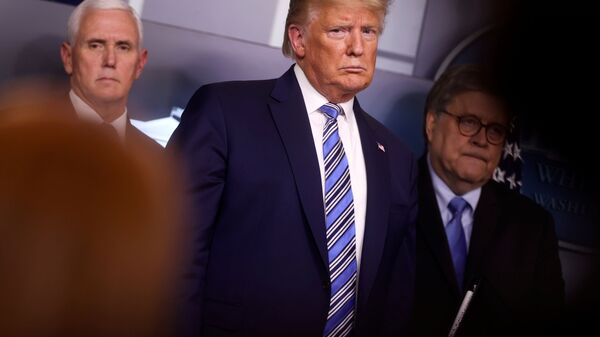Web developer and technologist Chris Garaffa and software engineer and technology and security analyst Patricia Gorky joined Radio Sputnik’s Loud and Clear on Monday to discuss the Trump administration’s reported interest in obtaining location data from US citizens’ smartphones and what that means for the civil rights of the American people.
“This is a very scary story,” Garaffa told hosts Brian Becker and John Kiriakou, explaining that while it is important to adhere to a number of guidelines advised by federal and local health agencies, “even in times of global crisis, we have to pay attention to our civil liberties. We have to be vigilant about defense of our own civil rights.”
According to the Washington Post, public health experts have lauded the GPS-tracking capabilities of governments in Taiwan, South Korea and Singapore as “remarkably effective” in helping slow the spread of the novel coronavirus.
“That actually could be very useful,” Garaffa admitted in reference to the software. “The problem is, I don’t trust these companies,” they said of Facebook and Google, “and I don’t trust the US government to properly anonymize and aggregate the information that they’re going to be handing over.”
Last year, the New York Times ran an opinion piece that dove into the topic of location tracking and what companies are able to do with that data. ”Twelve Million Phones, One Dataset, Zero Privacy,” written by Stuart A. Thompson and Charlie Warzel, noted that software development kits (SDKs) are common packages that are used to construct the features of an app.
“Facebook, Google and Amazon, for example, have extremely popular SDKs that allow smaller apps to connect to bigger companies’ ad platforms or help provide web traffic analytics or payment infrastructure,” revealed the article. Furthermore, according to data marketplace company VenPath’s CEO and founder Nick Hall, “if you have an SDK that’s frequently collecting location data, it is more than likely being resold across the industry,”
During his Monday press conference regarding the government’s response to the US COVID-19 outbreak, Trump echoed an earlier tweet from late Sunday night, in which he insisted that the country “cannot let the cure be worse than the problem itself.” While he did not provide an exact timetable for a return to normalcy, the US president made multiple assertions that the American economy could not function if people remained in their homes for months.
Trump seems to imply that we can't continue with extreme social distancing because the Trump economy is too good and we can't endanger that. pic.twitter.com/XlhUDZgJPL
— Josh Marshall (@joshtpm) March 23, 2020
Israeli Inspiration?
Sputnik reported earlier this month that Israeli Prime Minister Benjamin Netanyahu had ordered the tracking of coronavirus-infected patients via smartphone-based surveillance technology developed by the Shin Bet - the country’s internal secret service.
"There is no limit to what the Ministry of Health can do [with the data it receives on those infected by the virus], and there is no penalty for abusing the powers granted,” cyber law attorney Jonathan Klinger told Sputnik.
Like Garaffa, Klinger expressed misgivings about the government’s handling of the data. “I don't know whether I can trust the ministry [to erase the data], and I have no guarantee that mistakes won't happen and that this information would not be leaked,” he asserted.
Economic anxiety from the Trump administration regarding the COVID-19 outbreak, coupled with the Justice Department’s opposition to the recent shutdown of the National Security Agency’s controversial phone records program, has created a situation in which it appears the government would adopt drastic measures at the expense of citizens’ civil rights or even lives.
Gorky highlighted that while the government is in a rush to track people and say that the situation is contained, it has yet to accurately get a read on how the COVID-19 outbreak is realistically impacting the country.
“In reality, the government has not even tested its people. The government is not testing us for COVID; it’s not handing out tests. The only people we see getting the tests are the rich, are the famous, are really the elite in the ruling class of this society,” she said. “I think the fact that they’re saying, ‘We’ll just increase surveillance through your cell phones,’ but without any actual testing, shows that this really is not about public health at all.”




